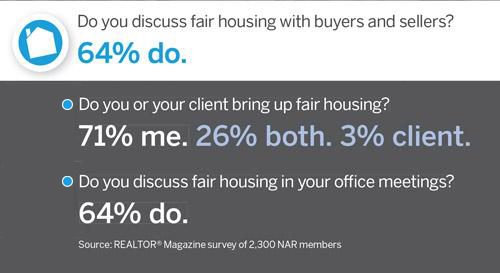Sandra Butler refused to let it slide when a seller she represented last year made what felt like a discriminatory comment. The seller thought the buyers, who had foreign-sounding names, were trying to negotiate for too many repairs. “I know how these people are, and they always want something for nothing,” Butler recalls the seller saying.
Butler is African-American. So was her client. And she didn’t want the seller to “think this conversation could be had because we look alike,” she says. Instead of flatly admonishing her client, Butler turned the conversation to fair housing law. “I said, ‘I don’t know the buyers or what they look like. I just know they are ready, willing, and able to purchase, and it’s our duty under the law to make your property available to them,’ ” says Butler, a sales associate with Sibcy Cline, REALTORS®, in Cincinnati. The deal ultimately fell apart over negotiation terms, but Butler was satisfied that she’d made her client more aware of a seller’s responsibility to abide by the federal Fair Housing Act, which prohibits inequitable treatment in the sale, rental, and financing of homes based on race, color, national origin, religion, sex, disability, and the presence of children.

That’s great news. And yet, fair housing challenges remain. Violations—and government efforts to enforce the law—continue. Nearly 10 percent of respondents to the survey said they had encountered discrimination in their markets, 18 percent of those saying it happened within the past month or “earlier this year.”
Fair housing organizations receive about 25,000 to 30,000 complaints each year, according to the National Fair Housing Alliance, a coalition of privately run fair housing groups. Yet, testing suggests there are many more instances of discrimination—the NFHA estimates about 3.7 million annually. The U.S. Department of Housing and Urban Development has conducted thousands of tests in recent years, employing housing organizations to send testers out to view for-sale and rental properties as a means of determining whether landlords, lenders, agents, and others in the real estate community treat protected classes differently.
Cliff Long, CEO of the Birmingham Association of REALTORS® in Alabama, says discrimination in the rental process is the biggest issue in his market. When he was relocating to Birmingham three years ago, he experienced it firsthand. Long, who is African-American, says several landlords wanted him to produce financial records before they would show him rental units—a practice that fair housing groups say is often aimed at minorities only. Having just taken the top job at the association, Long decided not to file a complaint.
Nearly all respondents said if they encountered potential discriminatory language or actions, they’d likely address it the way Butler did—by engaging in some straight talk about the law with their client. Less than 3 percent of respondents to the survey said they’d file a complaint, and less than 1 percent said they’ve ever filed a fair housing complaint.
Putting Your Training to Work
As a member of the National Association of REALTORS®, you’ve made a commitment to equal treatment—not just because it’s the law but as part of the REALTORS® Code of Ethics. NAR requires that members stay up to date on the Code, completing training at least every four years. In addition, states and localities often have their own fair housing laws, so state and local associations administer specific fair housing training for their members. Typically, licensees are required to take a two- or three-hour course every two to four years.
So there’s little doubt that when clients ask questions about quality of schools, local demographics, and neighborhood safety, you know to refer them to reliable information sources for answers rather than give your opinion. Resist the temptation to skirt the subject, says Mabel Guzman, CIPS, a sales associate at @properties in Chicago. You’re not teaching them anything by being coy. Be frank about why you can’t answer certain questions. Seize the opportunity to explain fair housing laws and why it would be illegal to offer your opinion.

The Challenges Ahead
When you’re working with first-time buyers, particularly from new immigrant populations, you may need to actively educate your clients about fair housing law. Immigrants are an increasing target for discrimination in real estate, contends Lisa Rice, NFHA executive vice president, and many are unfamiliar with their rights under the law. “If no one is mean or disrespectful,” she says, “it’s not the first thing on your mind that maybe that house wasn’t made available to you because you were being discriminated against. Trained real estate practitioners can recognize discrimination and be part of how we bring awareness to the public.” The Alliance expects to see a rise in national origin–related cases in the coming years, Rice says.
As a Muslim woman living in the south, Firdaus Rahman, CRS, GRI, a sales associate at RE/MAX Partners in Mobile, Ala., admits she’s worried that Islamophobia—a hot-button issue in the 2016 presidential race—is becoming more acceptable and leads to unfair treatment. Rahman has been teaching fair housing and diversity courses through the Alabama Real Estate Commission since 2002, but the curriculum doesn’t go deeply into religion. She says the training needs an overhaul to reflect new issues surfacing in the field.
“You have to understand where people from different cultures are coming from,” Rahman says, adding that sensitivity to certain holidays and holy days is an important part of working with clients.

Brokers can take the lead on that front and establish relationships with local fair housing organizations to get a better look at the issues facing local markets. After the NFHA filed discrimination lawsuits against several brokerages nationwide in 2007, including one in the Detroit area, Michigan REALTORS® partnered with fair housing groups around the state to bring regulators and practitioners together. The association developed a program to allow brokers to be voluntarily tested by fair housing groups for informational purposes, hoping it would foster more collaboration on training in the industry. “Part of the testing was about demystifying our relationship with fair housing centers,” says Brian Westrin, the association’s director of legal affairs. “There was a lot of unknown there about whether brokers could reach out and bring fair housing centers into their office for education.”
Addressing the Affordability Barrier
One of the underlying goals of fair housing law has been ending segregated housing patterns in the United States, but census data show the law has fallen short. So last year, President Barack Obama announced a new rule requiring local governments that receive federal housing funds to report how they use those funds to foster more integrated communities.
Lack of affordable housing can perpetuate segregation when it prevents protected classes from moving up the housing ladder. It’s a problem facing cities across the country, but none more acutely than San Francisco, where the median price was $940,000 in the fourth quarter of 2015. That’s why REALTORS® there have banded together to come up with solutions to the growing affordability crisis.
The real estate industry in San Francisco relies heavily on all-cash buyers—many from Asia—which pushes up prices and leaves other groups at a disadvantage, says Eugene Pak, president of the San Francisco Association of REALTORS® and sales manager at Climb Real Estate. One of SFAR’s primary goals this year is to work with local officials on a program to fast-track the permitting process for residential developments that will deliver a certain percentage of affordable units. It currently takes eight to 15 years to build a large development because of the intense permitting process, Pak says. “We don’t only care about the needs of our millionaire clients,” he adds. “We believe in housing for all.”
The country has come a long way over the past half-century when racial steering and disparate lending practices were common. And REALTORS® are on the forefront. But in an increasingly diverse country—where taking the first step toward buying or even renting can be a daunting task—you have an opportunity to do more: Teach your neighbors about what fairness in the real estate transaction looks like and empower those who’ve faced prejudice to challenge unequal treatment. Are you making the most of your platform?



